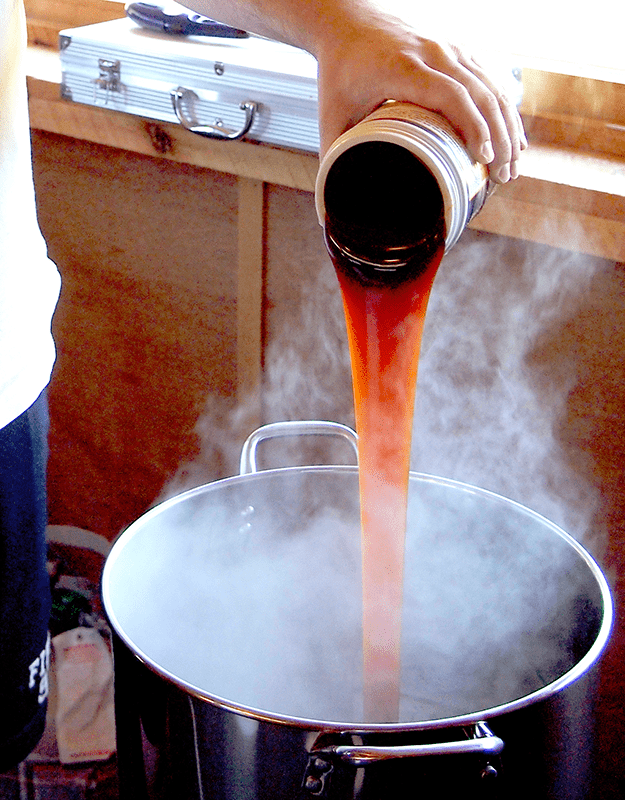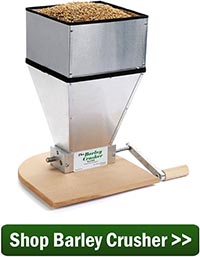 One of the eternal debates in the world of homebrewing is around the merits of malt extract vs all grain brewing. There’s no one-size-fits-all answer to the questions. Homebrewers who love to make beer the way the professionals do it prefer all grain brewing. Homebrewers with limited time, space, and equipment may find it easier to brew with malt extract. Though you will hear some people say that all grain brewing makes better beer, it is certainly possible to make great beer with malt extract, and conversely bad beer with all grain. Taste is not a concern here.
One of the eternal debates in the world of homebrewing is around the merits of malt extract vs all grain brewing. There’s no one-size-fits-all answer to the questions. Homebrewers who love to make beer the way the professionals do it prefer all grain brewing. Homebrewers with limited time, space, and equipment may find it easier to brew with malt extract. Though you will hear some people say that all grain brewing makes better beer, it is certainly possible to make great beer with malt extract, and conversely bad beer with all grain. Taste is not a concern here.
Whether you brew using extract or grain, it will ultimately be a decision based on your needs and constraints. Here are some of the primary differences between malt extract vs all grain brewing to consider when deciding which method to use in your home brewery:
Malt Extract Benefits
- Faster: With extract brewing, there’s no need to wait 60 minutes for the mash. Just mix the extract with water and you’re ready to start the boil. If you play your cards right, you can be done with a brew in as little as two hours, including cleanup.
- Easier: Again, with extract brewing, we skip the mash. That means no measuring pH and no measuring temperature.
- Less equipment required: When brewing with malt extract, there’s no need for a separate mash tun. This can easily save the homebrewer a hundred dollars or more.
- Less kettle capacity required: When brewing malt extract vs all grain, it’s typical to brew with a smaller kettle. Again, the smaller kettle makes extract brewing more economical for the budget brewer.
Malt Extract Drawbacks
- Higher ingredient cost: You will likely pay more for the malt and hops when brewing with extract. Malt extract tends to cost more than the amount of grain needed to achieve the same gravity. Additionally, extract brewers often use a higher gravity boil. Due to the higher gravity of the boil, hop utilization decreases and it takes more hops to extract an equal amount of bitterness.

- More difficult to brew lightly colored beers: Between two beers brewed to the same original gravity, one extract, one all-grain: the extract brew will most likely be darker. This can make it tricky to get beers like wits, Kölsches, and hefeweizens to come out on the lighter end of the color spectrum.
All Grain Brewing Benefits
- Ingredients cost less: As previously mentioned, you will probably spend less money brewing all grain vs malt extract when brewing the same beer.
- It’s how the pros do it: If you have aspirations to be a professional brewer, you should learn how to brew all-grain. The mechanics of mashing is very important component of brewing great beer.
All Grain Brewing Drawbacks
- Takes longer: A mash of 60 minutes or longer – plus the sparge – adds a significant amount of time to the brew day. If you’re tight on time, you may want to stick with malt extract.
- More mess: The mash leaves behind a significant amount of wet grain. You have to account for the extra time required to dispose of the grains and clean the mash tun.

- Requires more equipment: As mentioned earlier, all-grain brewing requires some additional equipment. The most economical way to get into all-grain brewing is Brew in a Bag.
There you have it: the pros and cons of malt extract vs all grain brewing. Whether you choose extract or all grain will depend on your cash flow, level of experience, and time availability. Regardless of the method you choose, be confident that you can brew great beers with great taste either way!
—–
David Ackley is a beer writer, brewer, and self-described “craft beer crusader.” He holds a General Certificate in Brewing from the Institute of Brewing and Distilling and is founder and editor of the Local Beer Blog.
